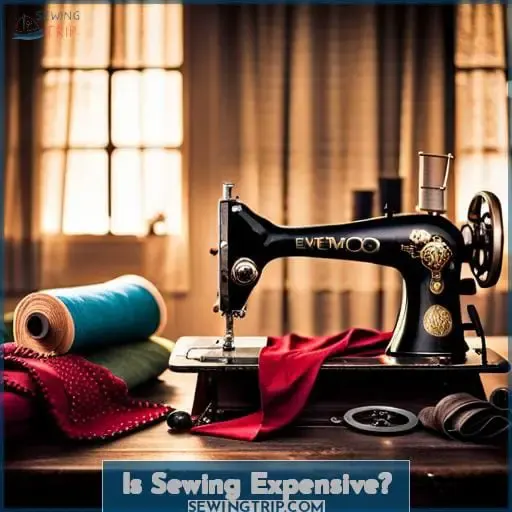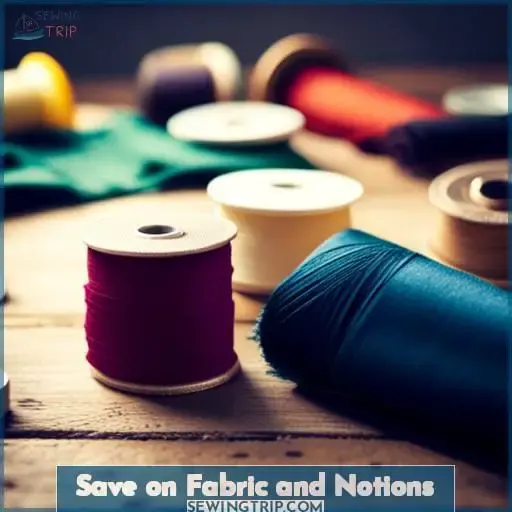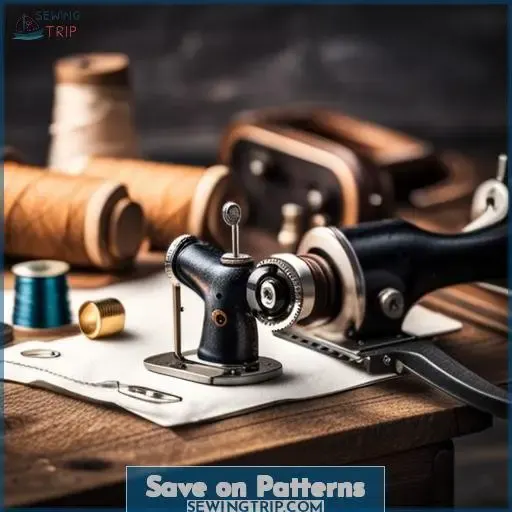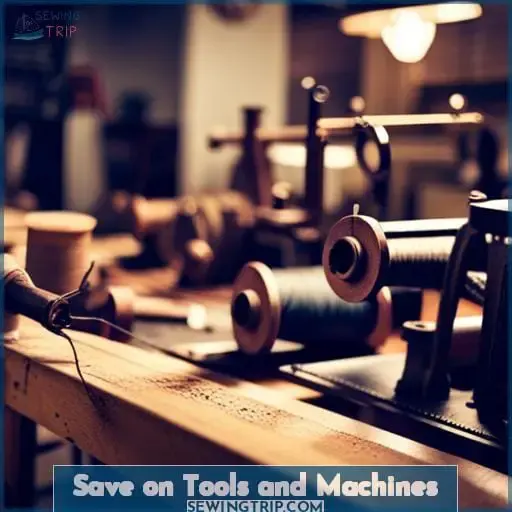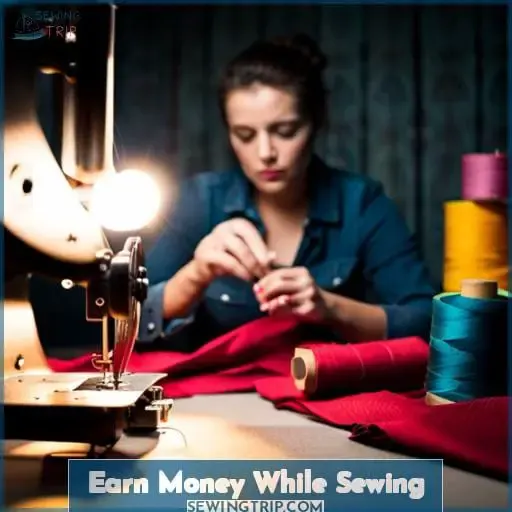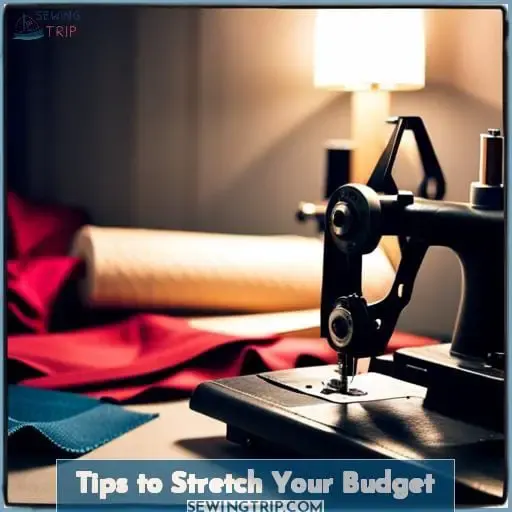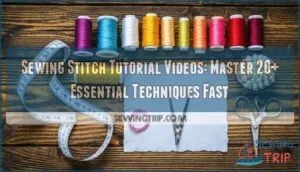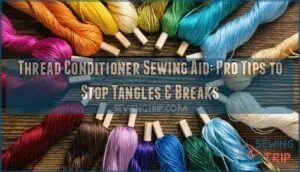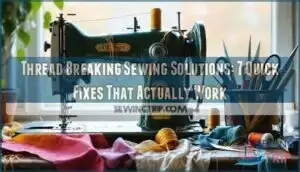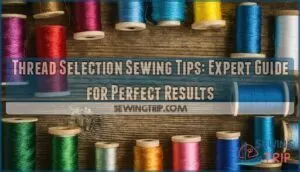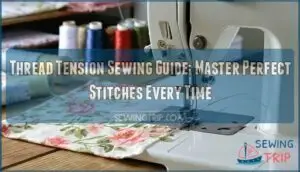This site is supported by our readers. We may earn a commission, at no cost to you, if you purchase through links.
 Ever wondered how to save money while sewing? After all, fabric and notions can be expensive. But don’t let that stop you from exploring your craft! With a few savvy tips, it’s possible to stretch your budget and get the most out of every project.
Ever wondered how to save money while sewing? After all, fabric and notions can be expensive. But don’t let that stop you from exploring your craft! With a few savvy tips, it’s possible to stretch your budget and get the most out of every project.
- Stalk sales at fabric stores and buy remnants, overstock fabrics, and end-of-bolt specials. Sign up for loyalty programs and newsletters to get coupons and alerts on promotions.
- Check out discount department stores, thrift shops, flea markets, and garage sales for used fabrics, trims, and sewing tools like scissors and rotary cutters.
- Before buying a pattern, see if your library has a sewing pattern lending library. Often you can borrow patterns for free. Or use online resources to find free sewing patterns.
- Buy machine needles, pins, thread, and other notions in bulk packages online to get the lowest prices.
- Invest in a solid, basic mechanical sewing machine, which often can be found online or secondhand for much less cost.
- Start small and work up to larger projects. Refine your skills on simple items like pajama pants, tote bags, and aprons before tackling more complex designs.
- See if any local sewing or craft clubs offer shared studio space, tools, and supplies.
With creativity and resourcefulness, you can sew stylish, custom garments and crafts while sticking to a budget.
Table Of Contents
Is Sewing Expensive?
Sewing is often seen as an expensive hobby, but with some careful planning and bargain hunting, it doesn’t have to break the bank. Start by really considering the time commitment and project planning involved. Having a dedicated sewing space with good storage and organization will save time and frustration.
Don’t buy every gadget and tool right away – build your skills first and add tools as needed.
Fabric and patterns can be pricey, but look for sales, coupons, and used options. Compare costs of making vs. buying finished items. Join a sewing circle to share materials and knowledge.
With strategic shopping, resourcefulness, and a bit of creativity, sewing can be an affordable and fulfilling hobby.
Save on Fabric and Notions
When it comes to saving money on your sewing projects, don’t overlook ways to cut costs on fabric and notions. Use your stash first, look for remnants and end cuts at the fabric store, and check out thrift stores for unique finds.
With a bit of effort, you can greatly reduce what you spend on materials for your sewing.
Use Your Stash
Don’t blow your budget buying more fabric and notions when you can dig through your sewing stash first. 1) Organize your fabric collection by color, pattern, and fiber type so you can easily see what’s on hand for upcoming projects.
2) Swap custom fabric orders and bulk discount buys with sewing friends to get premium materials at lower costs. 3) Repurpose old clothes, scraps, and thrift store finds as quilt backing, bias tape, scrunchies, or even simple patterns with some creative cutting.
Buy Remnants
Continue using what you already have in your stash, and consider buying remnants to save money on fabric and notions. Rent a sewing machine instead of buying one if you’re just starting out. Donate unused notions to others who can use them.
Barter sewing lessons with someone in exchange for their expertise in another area. Join craft swaps to trade materials with other sewers. Organize a sewing bee where everyone brings their own projects and shares tips and tricks with each other – it’s a great way to connect with fellow sewers.
Thrift Stores
You can also stretch your sewing budget by checking thrift stores for cheap or even free fabric, notions, patterns, and tools. Thrift store finds offer a treasure trove of sewing goodies. Look for bargain fabrics that can give your projects a unique touch.
Don’t overlook secondhand sewing machines, often in good condition. Vintage notions add a charming, vintage flair. And keep an eye out for discounted patterns to save even more. Explore your local thrift stores and discover sewing treasures waiting to be repurposed.
Save on Patterns
When it comes to saving money on your sewing projects, consider using free patterns and making alterations to existing ones. This savvy approach allows you to access a wide range of designs without breaking the bank.
By harnessing your creativity and sewing skills, you can tailor patterns to your preferences and budget, ensuring your sewing endeavors stay cost-effective and enjoyable.
Use Free Patterns
To further maximize your savings on sewing projects, explore the option of using free patterns. This cost-effective choice helps you keep your budget in check while still enjoying your sewing ventures.
You can easily find sewing tutorials and pattern ideas online, along with beginner tips and fabric suggestions. Additionally, many sewing enthusiasts offer free patterns through blogs, forums, and online classes.
Embrace these resources to create beautiful, affordable projects that fulfill your passion for sewing.
Alter Existing Patterns
Now, let’s dive into modifying your existing patterns to save on sewing expenses. Revamping patterns and making pattern adjustments can be a wallet-friendly way to create unique garments. Sewing modifications and pattern customization allow you to tailor designs to your preferences.
Whether it’s altering a neckline, adjusting the fit, or changing sleeve lengths, small changes can make a big difference. By learning the art of pattern alterations, you not only save money but also gain a valuable skill that can serve you well in your sewing journey.
Save on Tools and Machines
When it comes to saving money on your sewing journey, one key aspect to consider is how you can save on tools and machines. Buying used equipment and regularly maintaining your sewing machines can help you stretch your budget without compromising on quality.
In this section, we will explore some practical tips to ensure you get the most out of your sewing tools and machines while keeping your expenses in check.
Buy Used
Continuing from our previous topic on saving money through buying used patterns, let’s now delve into purchasing pre-owned tools and machines for your sewing projects.
-
Buy Secondhand Machines: Consider secondhand sewing machines from reputable sellers, ensuring they’re in good working condition.
-
Thrift Store Notions: Explore thrift stores for sewing notions like buttons, zippers, and threads at a fraction of the cost.
-
Used Tools: Look for gently used tools, including scissors, rotary cutters, and measuring tapes.
-
Resale Fabric: Seek out resale fabric stores to score discounted, high-quality fabrics for your projects.
By opting for secondhand options, you’ll not only save money but also contribute to sustainability in the sewing community.
Maintain Equipment
Keeping your sewing tools and machines in good condition is essential for saving money on your crafting endeavors. Regular equipment maintenance can prolong the lifespan of your sewing machines and ensure that your tools are always ready to use.
To care for your sewing machines, clean them regularly, oil the moving parts, and replace any worn-out components when necessary. Additionally, keep all your tools clean and organized to prevent damage or loss.
By following these maintenance tips, you can maximize equipment longevity while saving money on repairs or replacements in the long run.
Earn Money While Sewing
Now, let’s talk about how you can actually earn some extra cash while pursuing your passion for sewing. There are a couple of smart strategies you can use to make your sewing hobby more financially rewarding.
You can sell your beautiful creations, and we’ll explore some effective ways to do that. Plus, we’ll delve into cashback programs that can put money back in your pocket as you shop for fabric, patterns, and sewing tools.
Sell Your Creations
In the world of sewing, a great way to offset your costs is by selling your creations, allowing you to earn money while indulging in your passion. To s쳮d, promote your crafts on online markets where a vast audience awaits. When pricing your work, be competitive but consider the value of your time and materials.
Effective marketing strategies and customer engagement will set you apart. Your sewing hobby can become a thriving side business, fulfilling your desire for both creativity and financial stability.
Cash Back Programs
You can earn money while sewing by participating in Cash Back Programs. Here’s how to make the most of these opportunities in your frugal sewing journey:
- Sign up for cashback apps or websites tailored to sewing supplies.
- Utilize referral bonuses by sharing with your sewing friends.
- Stay updated on special sewing-related promotions for extra savings.
- Redeem your cashback for more sewing supplies or as a little treat for your hard work.
Get ready to sew and save simultaneously!
Tips to Stretch Your Budget
Looking to save money while pursuing your sewing passion? Here are two key points to keep in mind: First, consider repurposing and upcycling old fabrics and garments to breathe new life into your projects.
Second, use expensive materials sparingly, focusing on quality over quantity. These strategies will help you create beautiful, budget-friendly sewing projects without compromising creativity or style.
Repurpose and Upcycle
To stretch your budget while sewing, consider repurposing and upcycling materials to save money. Repurpose and upcycle old fabrics, garments, and household items to breathe new life into your sewing projects.
Get creative with DIY projects that transform unused items into unique, eco-friendly crafts. Sustainable solutions not only save you money but also contribute to a greener planet. Explore a world of possibilities and discover how repurposing and upcycling can be both economical and fulfilling.
Use Expensive Materials Sparingly
When aiming to maximize your sewing budget, an effective strategy involves using expensive materials sparingly in your projects. Sewing efficiency is crucial, and it’s not about compromising quality, but rather making thoughtful choices.
Explore budget-friendly fabric alternatives and get creative with patchwork and frugal stitching. Instead of opting for costly embellishments, choose more affordable options. By judiciously incorporating expensive materials and combining them with economical choices, you can create beautiful, cost-effective sewing projects that cater to your desire to save money while indulging in your crafting passions.
Conclusion
Saving money on sewing doesn’t have to be a challenge; there are plenty of creative ways to stretch your budget. From using your stash to buying used tools and machines, to repurposing and upcycling, and selling your creations, you can achieve savings that will make you smile.
As a wise person once said, A penny saved is a penny earned – and that’s certainly true when it comes to how to save money on sewing. So experiment, be creative, and have fun – and with a little bit of effort, you can save money while you sew.

